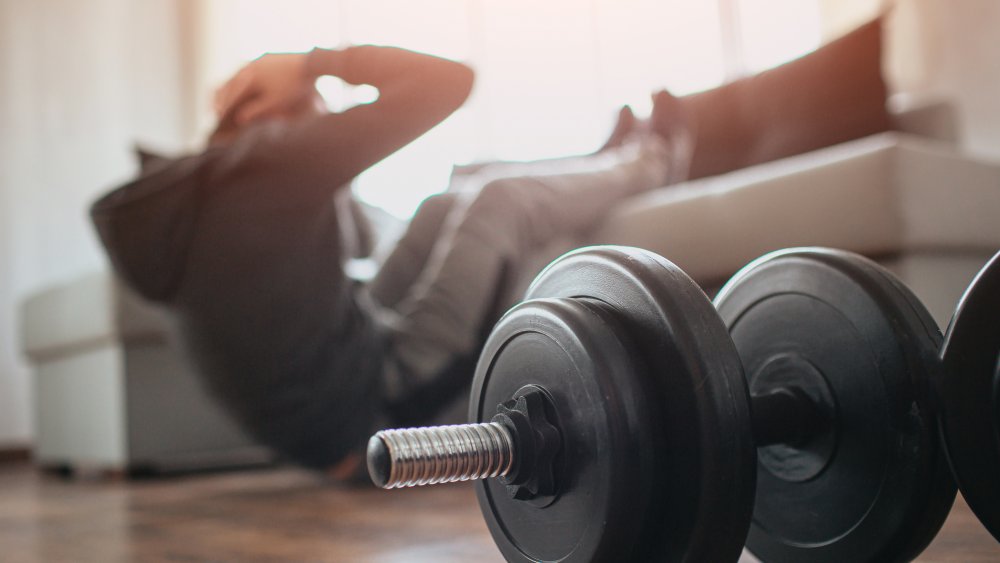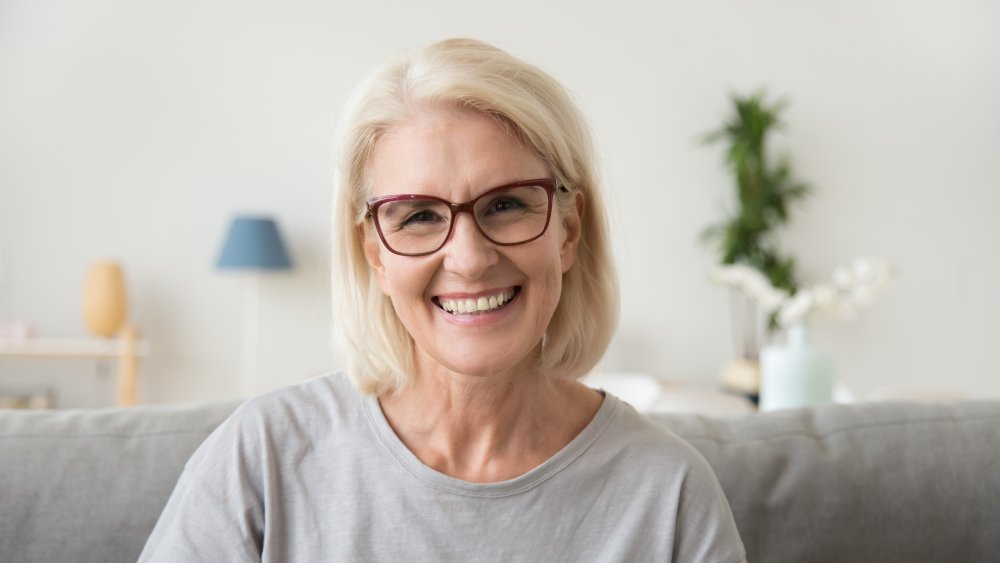Reasons Why It's Actually Healthier To Be Single
Whether you're single or in a relationship, you may view marriage as a significant milestone. People invest a lot of time into finding that special someone, going on dates, cultivating relationships, and eventually, planning the "perfect" wedding. Of course, even people who don't plan to get married often enter into long-term relationships and spend their lives alongside a significant other.
Being single, however, is generally portrayed as a lonely enterprise. Books, movies, and even our friends and family often make it seem like being in a long-term relationship should be the end goal. While having a significant other can be fulfilling for many people, that's not necessarily universal. There's absolutely nothing wrong with being single — many people even prefer it.
Far from being a lonely choice, being on your own actually has quite a few advantages, such as being able to live your life on your own schedule. And, according to some scientific studies, being single even provides some health benefits. That's right, being single isn't only a valid choice — it's actually healthier for you. Here's how.
Single people tend to exercise more
In theory, having a significant other translates to having a built-in workout buddy. In reality, though, single people tend to exercise more than their married counterparts. A study published in Journal of Marriage and Family (via Psychology Today) found that people who had never been married exercised the most, followed by those who were divorced or separated. The study, which was based on data collected from more than 13,000 American men and women who ranged in age from 18 to 64, found that men who had always been single spent, on average, eight minutes and three seconds exercising over the course of two weeks. Single women, on the other hand, spent five hours and 25 minutes exercising over the same period of time.
Married men, however, spent just four hours and 47 minutes exercising, while married women spent a solid four hours exercising. While exercising more doesn't automatically translate to better health, people who engage in regular exercise lower their risk for many ailments including depression, anxiety, cardiovascular disease, and certain cancers, as noted by the CDC.
Single people may have a larger social circle
Being single may sound like a lonely prospect to some, but studies reveal that not to be the case. People in long-term relationships may spend less time nurturing relationships outside of their romantic one whereas single people tend to invest more time into non-romantic relationships. A 2015 study published in the Journal of Social and Personal Relationships found that "being single increases the social connections of both women and men."
While married people may shift much of their attention from their friends to their significant others, maintaining friendships is quite important. As noted by the Mayo Clinic, having friends doesn't just "boost your happiness" and provide you with a strong support network, but it can also have an impact on your overall health. Those with a strong friend networks are less likely to develop several health problems, including depression and high blood pressure. Additionally, older adults who have "a rich social life" also tend to "live longer than their peers with fewer connections."
People who are single get more sleep
While it can be nice to cuddle up to someone at night, having the entire bed to yourself is also pretty phenomenal. When you're single, you don't have to worry about someone stealing the covers, putting their cold feet on you, or snoring throughout the night. That may be why so many people prefer to sleep alone — even if they're in a relationship. A survey conducted by the Better Sleep Council found that 26 percent of married couples reported sleeping better when they slept separately and more than half of surveyed couples — 63 percent — reported sleeping most of the night separated. It's no wonder, then, that single people sleep longer than those in relationships, according to a survey by AmeriSleep.
Of course, sleep has a huge impact on your health. As noted by Healthline, getting less than the recommended seven to nine hours of sleep per night can lead to myriad problems including memory issues, weakened immunity, high blood pressure, and an increased risk of heart disease and diabetes. The next time you get into bed alone, you'll be able to sprawl out in the center of the mattress without complaint and take comfort in knowing you're going to get a good night's sleep.
Single people are closer to their siblings
Single people are more likely to maintain close bonds with their families, including their siblings. As the Journal of Social and Personal Relationships highlighted, married people typically have less contact with their siblings compared to people who are single. Having a close bond with your little brother or big sister may not seem like the biggest deal but, according to The American Journal of Psychiatry, your relationship with your siblings can actually have an impact on your mental health.
Another study published in the Journal of Social and Personal Relationships found that having a close bond with your siblings is "associated with lower loneliness and depression and with higher self-esteem and life satisfaction." Of course, being in a relationship doesn't mean that your relationship with your siblings will automatically fall by the wayside, but this seems like a pretty good incentive for checking in on them regularly instead of just catching up with them at family gatherings.
Single people might see a boost in creativity
Those looking for a creative boost might want to consider the single life. According to two separate studies (via Medical News Today), not having a significant other can not only result in a boost in productivity but also a surge of creativity.
Why? As Kelly Campbell, the co-author of a study on creativity published in the Journal of Family Issues told Mic, a possible explanation is "that being creative in the arts gives people meaning and purpose in life." As creative pursuits "are often intensely personal and solitary," it makes sense that those who are single would be more likely to engage in such activities.
This might not seem like such a big benefit to those who don't consider themselves to be particularly creative, but partaking in creative activities can improve your health. You don't have to learn to play the piano or write a novel to reap these benefits, either. As noted by Forbes, even something as simply as coloring in an adult coloring book can be enough to get those creative juices flowing which, in turn, "improves brain function, mental health, and physical health."
Single people may have fewer regrets in life
There's the notion that single people will end up filled with regrets at the end of their lives. The idea that we have to have a partner to live life to the full is a total myth, though. People can thrive in singledom and may even wind up with fewer regrets if they choose to live their lives without a romantic partner. As clinical psychologist Russel Thackeray told O, The Oprah Magazine, "It's not uncommon for people who didn't have a chance to explore life on their own terms to experience regret."
Whether or not you plan to stay single forever, it's a good idea to use your alone time to really get to know yourself — to "get clear about what your values are," said clinical psychologist Roxy Zarrabi. If you later choose to find a partner, that's cool too, as you'll be "more likely ... to attract the type of partner that is the right fit for you," according to Zarrabi.
Single women tend to live longer
Unmarried women typically live longer than their married counterparts, Howard S. Friedman, psychology professor at the University of California, revealed to CBS News. Women who leave unhappy marriages also have longer lifespans. This longevity doesn't apply to men, though. Married men actually live longer than single men, while men who get divorced often experience a "downward spiral," according to the publication.
As Paul Dolan, a behavioral scientist and professor at the London School Economics, explained (via The Guardian), men reap more benefits from marriage because after they tie the knot they "calm down" and "take less risks." Women, however, typically die sooner if they get married.
While many people may be tempted to feel sorry for women who never marry or have kids, they shouldn't. Not only is a single, childfree lifestyle a valid choice, it's actually one that's good for women's mental and physical health. Dolan revealed, "The healthiest and happiest population subgroup are women who never married or had children."
Single people are more independent
Many single people can't wait to find someone to share their lives with, but there's a lot to be said for the single life. While people in relationships can certainly retain their independence, people who go the single route are more likely to be independent. As psychologist and relationship expert Niloo Dardashti explained to Time, people often feel like "they've lost themselves" in relationships "largely because we stop doing things independently" when we have a significant other.
Single people, however, have more alone time than those in relationships to work on personal development — something that is critical to maintain a sense of independence and to stay "in touch" with themselves. The importance of being independent is not to be underestimated. As psychologist Sonja Lyubomirsky told CNN, a lack of autonomy can not only increase your stress levels but can also lead to poor overall health.
Independence is also linked to happiness. Diana Boer, a researcher in Germany, analyzed data from more than 420,000 subjects and found that the amount of control a person has over their own life is a big indicator of their well-being. Boer told CNN "that every person needs to follow her own path to a full life."
Single people may have to manage less stress
Dating can be stressful. Relationships can be stressful. Perhaps that's why people who choose the single life have less stress in general. As relationship expert Susan Winter told Time, "Believe it or not, relationships are 'mentally' expensive." She further revealed that they take up "a lot of space in our heads." People in relationships spend a lot of time worrying, whether it's about the state of their relationship or just "fear for [their partner's] health and well being."
A study published in the Journal of Gerontology: Social Sciences (via Psychology Today) found that older people who had never been married reported less stress than those who had been divorced or widowed. Stress does more than just wear you out mentally and emotionally. Per the Mayo Clinic, stress can also affect your body and your behavior.
Common ailments caused by stress include headaches, chest pain, stomachaches, fatigue, and depression. An unmanaged stress can lead to all sorts of health problems, including high blood pressure, heart disease, and diabetes.
Staying single can improve your confidence
Being single gives you a lot of space to work on your personal growth. Maybe this is why people who are single have higher levels of confidence and self-esteem. Psychologist Carolin Müller told Insider that many people seek out relationships because they are afraid of being on their own, but that this is "a weird fear" as the single life "is a good opportunity to get to know yourself and learn to love yourself more."
Spending some time on your own can help you find your own inner strength, psychologist and relationship expert Niloo Dardashti told Time. When you have a partner, it's easy to lean on them "for a lot more than what we need to," the expert explained. Being on your own and realizing that you don't need anyone else to be happy, however, can be incredibly empowering. "Solitude breeds self-reflection, and self-reflection breed's confidence," relationship expert Susan Winter told the publication.
This added confidence can carry over not into just any potential romantic relationships in the future, but non-romantic relationships as well. A confidence boost can also lead to a health boost and a longer life, as noted by the Courier-Journal.
Single people often have lower BMIs
People who live on their own typically weigh less than their coupled-up counterparts. According to a study published in the Journal of Family Issues (via CNN Health), single people were found to have a lower body mass index (BMI) than those who are married or cohabiting. While weight and BMI are not necessarily indicators of health — people with a higher BMI can be perfectly healthy — higher BMIs are often linked to several chronic health conditions including diabetes and heart disease.
But, why do married people usually weigh more? Jay Teachman, the study's author and a sociologist at Western Washington University, postulated that the reason married people tend to have a higher BMI is that they are more likely than single people to cook and eat together. Single people, on the other hand, may feel pressured to have a slimmer body because they are "likely more concerned about how they look because they are in the dating market."
Single people may weigh less, but that doesn't necessarily translate to healthy eating. As noted by Time, another study showed that people who eat on their own tend to eat foods that aren't as healthy and eat fewer fruits and veggies.
People who are single have less debt
"Being single has made me happier and healthier, but also braver when it comes to talking about money and I hope to encourage more people to do the same," author Lucy Vine told Independent. Not only may some single people be more open about their finances, they may have more to talk about in that area.
In theory, being married translates to a higher income as you are more likely to have two people bringing home a paycheck. However, married couples also tend to have larger amounts of debt. According to research analyzed by Debt.org, 21 percent of single people are carrying credit card debt compared to 27 percent of married couples with children and 36 percent of married couples without children.
While carrying a credit card balance may not seem like it can have an impact on your health, it does. Being in debt can negatively affect your mental health, as noted by a study published in Social Science & Medicine. According to the study, having debt is linked to increased stress and depression. Feeling overwhelmed by debt is also linked to higher blood pressure, and people with a lot of debt also reported being in worse health.
Single people do more volunteer work
When you don't have a significant other, you have a lot more free time to not only explore your own interests and hobbies but to give back to the community as well. Research shows that people who are single are more likely to lend a helping hand than those who are married. As noted by Psychology Today, single people are more likely to help friends and neighbors with things like running errands, yard work, or giving someone a ride. They're also more likely to dole out helpful advice and provide emotional support for people in their social networks, as well as engage in volunteer work.
How does helping others help you? Giving back is good for your physical and mental health, as noted by Help Guide. Helping other people can provide you with a sense of purpose and improve your self confidence. It can also reduce stress and combat depression. Volunteering has also been linked to a lower mortality rate. Additionally, older people who volunteer their time tend to be more physically active and "are less likely to develop high blood pressure, and have better thinking skills."













